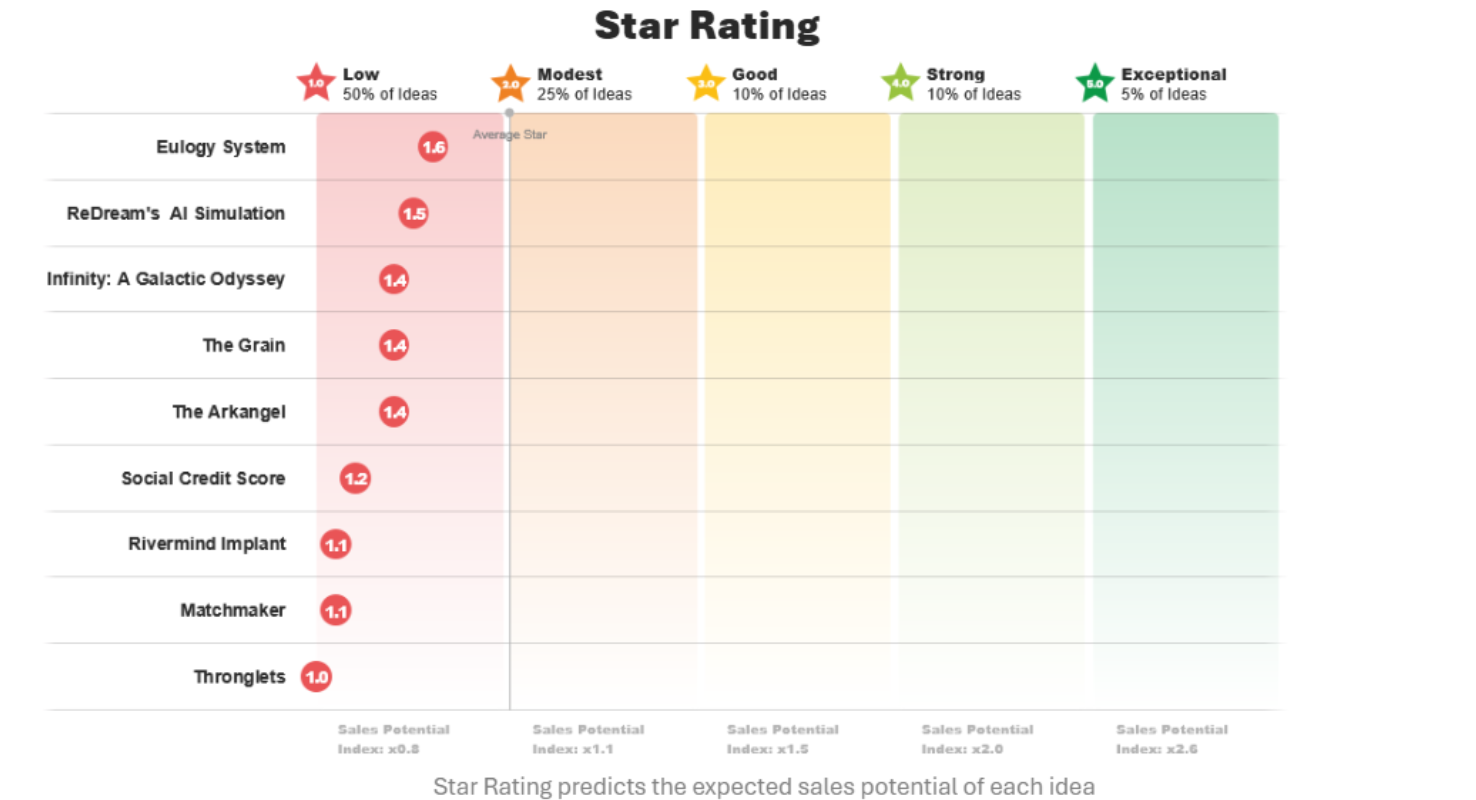Are Consumers Ready for Black Mirror Innovations?
As Black Mirror returned for its highly anticipated seventh season, it introduced a wave of unsettling technological innovations that feel increasingly close to reality. From AI-powered eulogy systems to digital lifeforms like Thronglets, these fictional concepts tap into emerging tech trends that could reshape our future in unpredictable ways.
But how would consumers react to these innovations if they were real today? To find out we put five new season innovations, and several from previous seasons to the test using System1’s Test Your Innovation platform.
Testing Black Mirror Innovations: A Reality Check
System1’s Test Your Innovation platform uses emotional measurement to predict and improve the commercial impact of ideas, helping brands identify which concepts have the greatest potential for success in the market. For this experiment, we tested nine Black Mirror innovations, including concepts that blend technology with memory, gaming, and the future of life extension. Some of the most thought-provoking ideas tested include:
1. Eulogy System – An AI-powered platform that generates personalized eulogies for the deceased.
2. ReDream’s AI Simulation – A system that allows individuals to experience their past memories in a hyper-realistic, immersive way.
3. The Grain – A device that stores and visualizes every memory in a person’s life.
4. Infinity: A Galactic Odyssey – A video game that immerses players in an evolving galactic story.
5. Thronglets – Digital lifeforms that form an interactive, AI-driven social experience.
6. Rivermind Implant – A device that uploads consciousness to a digital network, offering life extension for the terminally ill.
We also revisited popular innovations from earlier seasons of Black Mirror, including:
- Matchmaker – The dating app featured in Hang the DJ (Season 4).
- Arkangel – A child safety monitor introduced in Season 2.
- Social Credit Score – The peer-based social system from Nosedive (Season 3).
The Results: Consumers Are Not Ready (Yet)
The results were clear: Black Mirror’s futuristic ideas are a step too far for today’s consumers. While successful innovations typically elicit around 80% happiness and 20% surprise, these concepts from Black Mirror scored just 27% happiness and 13% surprise on average. All ideas received a 1-Star rating, indicating low anticipated uptake.
It’s safe to say that UK consumers are not ready to embrace these dystopian futures just yet. However, while these innovations may seem too futuristic for now, consumer feedback reveals valuable insights into what might make these ideas more palatable in the future.

Key Insights from the Test
1. Mental Health Concerns: The main concern among consumers was the potential negative impact these technologies could have on mental health. The idea of constant digital interactions or the merging of reality with technology raised significant apprehension.
2. Affordability: Many respondents believed these innovations would be prohibitively expensive, offering little more than what is already available in today’s market.
3. Emotional Appeal: Despite the overall scepticism, there was a clear positive sentiment around innovations that allowed people to relive meaningful moments with family and loved ones. The emotional appeal of connection and memory was a standout feature that could potentially shift consumer acceptance in the future.
What This Means for Brands and Innovators
As a long-time observer of cultural trends and innovation, I’ve seen how shows like Black Mirror push the boundaries of imagination and technology. Netflix has always been at the forefront of challenging its audience to think deeply about the future of technology and its impact on society. The innovations presented in the latest season of Black Mirror are no exception. They are bold, creative, and at times, unsettling, sparking conversations about ethics, humanity, and the potential consequences of unchecked technological progress.
Our testing on these concepts revealed some important insights. While many of these ideas are captivating from a storytelling perspective, the consumer response shows a different story. People are prioritizing their mental health over futuristic advancements. They are not rejecting technology per se but are expressing concern about the potential emotional toll these innovations could have. Whether it’s a digital eulogy or the idea of uploading consciousness to a network, the fear is that these technologies could disrupt rather than enhance our lives.
The Black Mirror innovations may not be ready for the market right now, but the conversations they prompt are crucial. Consumers aren’t against technological progress; they just want to ensure that it’s in line with their emotional needs and that it adds real value to their lives.
The Future of Innovation
As we continue to move forward into an increasingly digital and automated world, brands and innovators must consider consumer emotions and societal impact more closely. It’s no longer enough to push technology for technology’s sake. To gain acceptance, innovations must resonate with consumers on a deeper level and address concerns about mental health, privacy, and human connection.
Looking ahead, the challenge for brands will be finding the balance between progress and purpose. How can we innovate in ways that enhance life, rather than disrupt it? How can we ensure that technology serves the needs of society and not the other way around? These are the questions we’ll need to answer to create technologies that are both groundbreaking and responsible.
For now, Black Mirror serves as a cautionary tale, a reminder that unchecked innovation can have unintended consequences. But it also offers a challenge: to develop innovations that are not only innovative but also aligned with what consumers truly want and need. It’s a challenge I believe we’re all capable of meeting if we approach the future with both creativity and empathy.
Create with Confidence
The key to striking the right balance is simple: test, refine, optimise. System1’s Test Your Innovation platform enables you to test new products, packaging, messaging, taglines before launching to market, predicting their success well before launch. Don’t guess whether consumers are ready for your innovation, ask them directly first and Create with Confidence.

